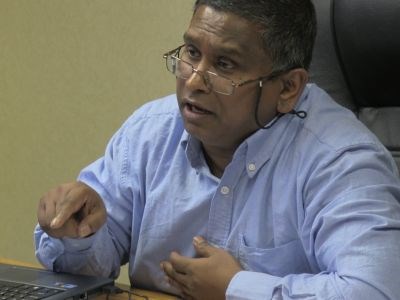The Ontario Human Rights Tribunal has dismissed a human rights complaint filed by a former city employee who claimed he was being forced to clean washrooms because he is Sri Lankan.
Keith Brennenstuhl, the tribunal’s vice-chair, wrote in his April 4 ruling that Neville Hewage failed to provide convincing evidence that he was singled out.
“Stating that he is Sri Lankan and that his bosses are ‘white’ does not establish the necessary connection between the respondents’ alleged actions and the grounds pleaded by the applicant,” Brennenstuhl wrote.
“Moreover, there is no evidence that demonstrates that the applicant was being treated differentially from the other water operators. The was no evidence that the applicant could point to that would challenge the respondent’s position, as stated in the job description, that cleaning washrooms is a duty of all water operators.”
Hewage’s initial complaint named several city staff members and made several accusations. However, he amended his complaint to include just four city managers — Nick Benkovich, Gary Comin, Drew Peloquin and Kevin Fowke – and just one accusation – that, because he is East Indian, he was ordered to clean urine and feces in bathrooms at the water treatment plant where he worked as a water operator.
At a Jan. 25 summary hearing to determine whether there was enough evidence for the case to proceed, Hewage said he was claiming discrimination based on his race, colour, ethnic origin, place of birth and ancestry.
Up until his dismissal in August 2012, Hewage was a water treatment operator at the city’s Wanapitei Water Treatment Plant.
The issue of cleaning the bathrooms arose in November 2011, Hewage said. His resistance led to a suspension in March 2012 and his eventual dismissal.
He told Brennenstuhl that cleaning “urine and feces” was not part of the water operator’s job description, and he accused staff of not flushing the toilet, a move he says was directed at him.
“This was done only to me,” Hewage said. “They singled me out ... Board operators never, ever cleaned the feces and urine of others. And when I was hired, there was no mention of toilet cleaning.”
After he filed his complaint, Hewage said the city tried to put cleaning in the operator’s job description, a move that led to 36 staff members to file grievances.
The city countered that cleaning bathrooms was always part of the duties of water operators, something Hewage knew when he was hired. Firefighters also know they have to maintain their bathrooms, even though it’s not in their job description.
They argued the grievances were linked to a petition Hewage started - and got other operators to sign - opposing the cleaning duties and pushing the city to hire custodial staff to do the work.
The union local is backing that effort and that’s why so many grievances were filed when cleaning was added to the job description.
Further they have documentation that shows Hewage knew as far back as 2008 that cleaning duties were part of the job.
In his ruling, Brennenstuhl said there’s evidence Hewage and the other water operators don’t like cleaning bathrooms, but none that Hewage was singled out.
“In my view, there is no evidence that the applicant could point to that would suggest that the requirement to clean washrooms is particular to the applicant or that the duty is in any way linked to the applicant’s Sri Lankan heritage,” Brennenstuhl ruled.
At the summary hearing, Hewage said cleaning bathrooms is a particularly sensitive issue for him because of his cultural heritage. In India, people consider cleaning bathrooms a job for “coolies,” or untouchables in the Hindu caste system.
Untouchables are considered to be beneath other Hindus and face widespread discrimination in India.
“So because I was a coolie, an untouchable, I was being forced to clean toilets,” he said. “An all-out war had started against me.”
But Brennenstuhl said Hewage provided no proof that Sri Lankans have a cultural sensitivity to cleaning washrooms. He also didn’t make that claim in his initial complaint, raising it for the first time during the hearing.
‘I am not satisfied that the applicant has pointed to evidence that would establish that Sri Lankans have a sensitivity to cleaning washrooms beyond that which may be experienced by many people of any culture,” he wrote. “For all these reasons, the application is dismissed.”
At the January hearing, Mireille Khoraych, of the Toronto firm Hicks Morley Hamilton Stewart Storie LLP, also asked Brennenstuhl to force Hewage to shut the Wikileaks Sudbury website, which she said Hewage is using to personally attack certain city managers.
Khoraych said Hewage has a vendetta against the city employees named in his complaint, and has used the Wikileaks Sudbury website and the media to attack them personally. So she asked for a publication ban, as well as for the website to be shut.
“He has taken information and data (from the FOI requests) and presented it in such a way that it misrepresents the truth,” she said. “We should not allow him to attack these individuals in public.”
However, Brennenstuhl makes no mention of the website in his ruling.
Join Sudbury.com+
- Messages
- Post a Listing
- Your Listings
- Your Profile
- Your Subscriptions
- Your Likes
- Your Business
- Support Local News
- Payment History
Sudbury.com+ members
Already a +member?
Not a +member?
Sign up for a Sudbury.com+ account for instant access to upcoming contests, local offers, auctions and so much more.
